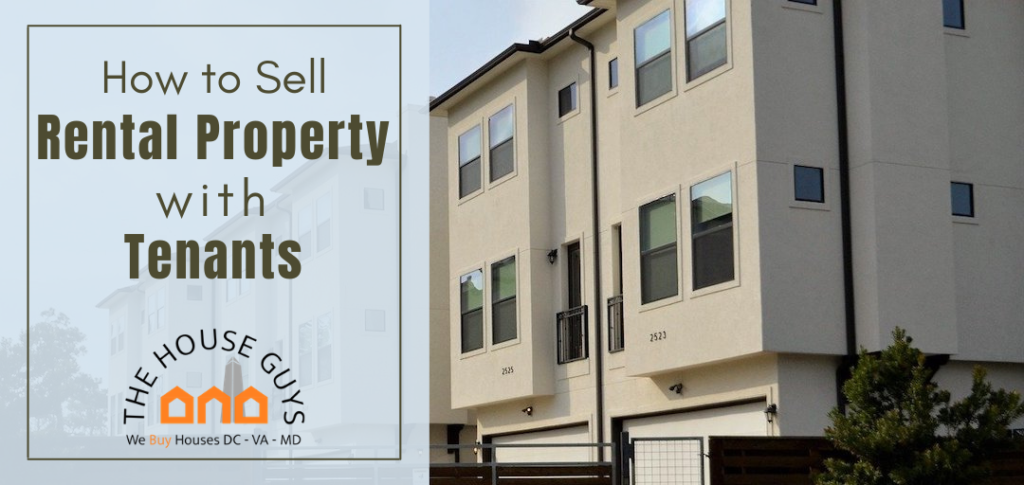
As a rental property owner, you may be considering selling your property. You know the process is going to take some time and involve some expenses, but what about if there are tenants in your property? In most cases, sellers will want to figure out how to sell a property with tenants before they list their home for sale.
In order to have a successful sale, you’ll need to take into account both the tenant’s rights under the lease or rental agreement as well as state and local law. This ensures that your property will be viewed in its best light while also giving yourself some protection from any potential legal consequences. Check out our complete guide on how to sell your rental property with tenants to learn more.
- It is legal to sell a rental property with existing tenants, however the state and local laws can vary the sales process.
- The type of rental property you’re selling can determine whether you have interest from retail buyers or investors.
- Keep your tenant(s) in the loop about the sale of the property (some states give tenants first right of refusal).
- Tenants can remain in the property after the sale depending on the lease agreement and notice given by the landlord.
Table of Contents
1. Can I Sell My Rental Property with Tenants?
2. Should I Sell My Rental Property with Tenants?
a. Type of Rental Property
b. Quality of Sitting Tenants
3. When Should I Sell My Investment Property?
4. How To Sell a Rental Property with Tenants
a. Step 1: Understand State and Local Laws
b. Step 2: Communicate Sale to Tenants
c. Step 3: Determine Selling Method
d. Step 4: Schedule Convenient Showings
e. Step 5: Warm Hand Off of Tenants to Buyer
5. What Happens to Tenants when Rental Property is Sold?
Can I Sell My Rental Property with Tenants?
Yes, it is legal to sell your rental property with tenants still living there. However, be cognizant of the state and local laws to ensure you’re following the legal process in terms of the sale. Know how much notice is required to give the tenants if you’re expecting them to move out at the end of their lease.
Having the ability to sell your investment property with tenants doesn’t necessarily mean this is the ideal option– there are several factors to consider when determining whether you should sell your property with tenants.
Should I Sell My Rental Property with Tenants?
Whether you should sell your rental property with tenants highly depends on your situation. From the type of real estate property you’re looking to sell to the quality of your existing tenants, there are many factors to consider when deciding if it’s better to sell a tenant occupied property. The current tenants’ lease or rental agreements are another consideration, as month-to-month versus fixed-term can influence a buyer’s decision.
Type of Rental Property

The type of rental home you’re trying to sell will affect the available pool of potential buyers. Determine whether your property is best sold to a retail homebuyer or an investor by checking out comparable homes in your area and talking to a local real estate agent. If the comps are occupied by families or young couples, your home is more likely to attract buyers who don’t plan to rent out the property. If the nearby homes are being rented, investors may be a better fit for the sale and enable you to sell with your existing tenants.
If your property attracts retail buyers (e.g. families, first-time homebuyers)…
You will get the best price by selling without tenants in the property. Many retail buyers use conventional financing to purchase property– these buyers must move into the house within 60 days of closing. This means you could sell your property with tenants on a month-to-month lease or a fixed-term lease that expires in less than 2 months. Or, you could wait until the leases expire to list the property, so potential buyers can see the space free of other people’s belongings. In addition, you can make repairs to get the home market ready without affecting the tenants.
If your property attracts investors…
You need to examine the quality of your existing tenants. In some cases, an investor may look at existing tenants as an asset, and in other cases, the tenants may be viewed as a burden– this will affect the price you can get for the home.
Quality of Sitting Tenants
Selling a property with sitting tenants can add value when they are paying adequate rent for the area on time every month. This is attractive to investors, as they won’t have to spend time and resources filling a vacant room or unit.
On the flip side, difficult or frustrating tenants not only could be a challenge to schedule showings for potential buyers to view the property, but no investor is going to want to purchase a hassle (unless the asking price is significantly reduced)– you will get more money for your investment property with no tenants than a bad tenant.
Keep Tenant Records
As a landlord, make sure to have records showing the tenant has paid rent on-time and the duration of time the tenant has been renting the property. This provides proof to buyers and can help sell your home quickly if you have a long term tenant who doesn’t miss rent payments. You also want to provide the current lease agreement, as certain clauses in the agreement can make the terms more or less investor-friendly.
If you’re selling a house with tenants who have not been paying rent recently, the value of the home can be affected negatively. This is especially true in states that favor tenants’ rights such as Maryland and Washington DC, as evictions are not a simple process.
When Should I Sell My Investment Property?
Timing the sale of your investment property is crucial if you want a fast sale with many potential buyers. Pay attention to when the tenants’ leases are expiring. A month-to-month lease will provide you with the most freedom whereas a fixed-term lease could complicate matters if you want to sell without a tenant.
Month-to-Month Lease
If the rental agreement is month-to-month and you expect your tenant to move out upon expiration, you must give your tenant proper notice per the state or local law.
Virginia code section 55.1-1253 requires 30 day written notice from when the next rent payment is due unless the lease agreement specifies a longer time period.
Maryland state law requires a landlord to provide written notice to the tenant 1 month before the end the month when the tenant needs to leave. However, your county or jurisdiction within the county can have more restrictive laws.
Washington DC does not allow a landlord to ask a tenant to leave even when the tenant’s month-to-month lease is expiring without just cause. Just cause can include selling your rental property to a homeowner who plans to occupy the home (i.e. not rent it out).

Fixed-Term Lease
A fixed-term lease may leave you with no option but to sell with tenants depending on your timeline. However, if you’re planning to sell to an investor and have high quality tenants in place, there may be no need to wait for the lease to expire.
If you want to sell to a retail buyer without tenants in your property and cannot wait for the lease to expire, you could try negotiating with your tenant to end the lease early. There are several methods including cash for keys, selling to your tenant, and helping your tenant find a new home. If none of these tactics work, you may have no option but to sell with a tenant in place to an investor or wait for the lease(s) to expire.
How To Sell a Rental Property with Tenants
Tenants can require a lot of work, and this is a common reason landlords choose to sell their property (among many other reasons). Selling with tenants doesn’t have to be a hassle depending on where your property is located and how you choose to sell. The following 5 steps break down the process of selling a rental property with tenants and provide insight into some of the real estate laws in Virginia, Maryland, and Washington DC.
Step 1: Understand State and Local Laws

Each state has different laws when it comes to tenants’ rights, and within each state there can be county laws, and within counties there can be jurisdiction laws. Make sure you understand the laws in your region or work with someone who does such as a property manager, attorney, or real estate agent.
It’s important to identify in the state and local law how far in advance you need to notify tenants of the home sale and how much notice your tenants need for you to allow visitors in for showings.
Virginia: The state law is used across counties.
Maryland: The state law is made more restrictive in certain counties and sometimes jurisdictions within those counties. For example, in Prince George’s County you are required to give tenants a right of first refusal for affordable multi-family housing.
Washington DC: There are unique laws and regulations to follow via TOPA (Tenant Opportunity to Purchase Act).
Step 2: Communicate Sale to Tenants

Open communication with your tenants starting with when you decide to sell the property can build trust with your tenants. Discuss the process of selling the house and any possible impact it could have on them. Explain how you will work to mitigate disruption in their daily lives by scheduling showings during normal working hours and around their schedule when possible.
If you are looking to sell the property with tenants and not have them move out, you should give verbal notice as a courtesy since you will be coordinating with the tenants for house showings.
Virginia: There is no state law requiring tenants to be notified you’re selling the property until it is sold as long as the tenants are continuing to reside in the property.
Maryland: The required communication to tenants is on a county by county basis and sometimes on a local jurisdiction basis.
Washington DC: You may be required to offer the property to your tenants before selling the home to a third party per TOPA.
Step 3: Determine Selling Method
Selling Rental Property to an Investor
Assuming you have decided to sell your rental property with tenants who will be continuing their lease after closing, an investor will be your best option. Investors may be looking to add a rental to their portfolio or know of other buyers who would be interested. In addition, you don’t have to list your home on the market or make repairs, as an investor will purchase as-is and take care of any deferred maintenance.
Selling to an investor is the most hassle free way to sell a tenant occupied property, but keep in mind, if your tenants are problematic (i.e. not paying rent) or paying below market price for rent, an investor may be deterred or offer less than what you’re hoping. You can find local investors in your area online as any credible “We buy houses” company will have a professional online presence.
If you have a rental property you want to sell with tenants in Virginia, Maryland, or Washington DC, The House Guys can make you a fair cash offer. We buy properties in as-is condition and cover all closing costs.
Selling Rental Property with an Agent

Let’s assume you have decided to sell your rental property with tenants who will not be continuing their lease after closing. This is a situation where retail buyers may be interested if the house is brought up to market standards in terms of repairs and upgrades. To get the most amount of money for your property, working with a real estate agent to list your home on the MLS is your best option.
Keep in mind that selling with tenants in the house to a retail buyer will garner a lower price than selling without tenants because homes sell best staged and cleared of all personal items. Although, the home will not be rid of all tenant’s belongings during showings, the prospective homeowner will be able to move into an empty home after closing.
Selling Rental Property to Tenants
You may not have to look far for a buyer if your tenants are looking to be homeowners. Let them know before you list the property to see if they have interest in buying it. However, don’t necessarily compromise profit for convenience– it may still be worth going through the process of listing your home with a real estate agent or finding a local cash home buyer if what your tenants are willing to offer is lower than your asking price range.
Step 4: Schedule Convenient Showings

Many states require landlords to give 24-48 hour notice before entering the property— this includes showings with investors, real estate agents, and buyers. Confirm the required notice period as specified by the state or local law. Not only does giving advanced notice adhere to the law, it also shows your tenants you respect their time and personal space. Confirm your tenants’ schedules, and ask for their preferred days and times for showings.
Virginia: A landlord needs to give 24 hour notice to enter the property as required in code section 55.1-1229.
Maryland: The law is specified per county– Prince George’s County requires 24 hour notice for the landlord to enter the property during a reasonable time in section 13-155.
Washington DC: Requires 48 hour written notice for access to the property during an agreed upon time between tenant and landlord.
Can a Tenant Refuse Viewings?
A tenant can refuse viewings if the landlord did not give proper notice or scheduled an unreasonable viewing (e.g. a showing in the middle of the night) as specified in the state law or lease agreement. However, if the proper notice has been given, a tenant does not have the right to say no to reasonable viewings. Use your best judgement if you have a problematic tenant denying access to the property, as you don’t want to put any potential buyers in an unpleasant or unsafe situation.
Step 5: Warm Hand Off of Tenants to Buyer

After closing on a property, it’s courteous to write a letter signed by yourself informing the tenant of the sale of the property and directing them to send their next rent payment to the new landlord. If you want to go the extra mile, you could invite the buyer to the home and introduce him/her to the tenant(s) if they didn’t meet at the showing.
In many cases, the owner of the property is just in the background, so the tenant is unaffected by a changing owner as long as the property management company remains the same. However, per Virginia code section 55.1-1216 the landlord must notify the tenant of the sale and give the name, address, and telephone number of the buyer.
What Happens to Tenants when Rental Property is Sold?

Depending on the tenant’s lease agreement, the tenant will either be moving out or continuing to reside in the property. If you are expecting the tenant to move out, this had to be communicated to the tenant in advance of selling the property, and their lease must be expiring.
If the tenant has a fixed-term lease that is not expiring, the lease is still valid when the property is sold and will continue under the new owner, as the lease is tied to the property not the owner. This means the tenant has a right to live in the property until the lease expires regardless of the home sale, and the rent price cannot increase with change of owner in the middle of a lease agreement.
Final Thoughts: How To Sell a Rental Property with Tenants
The idea of selling a rental property with tenants can be daunting. The positives are that it is more appealing to buyers who want an ongoing tenant in the home. However, there’s also cons like getting prospective buyers through the front door to show them what your place has to offer. In addition, sitting tenants can make showings harder due to coordinating schedules between renters and potential buyers.
There are more options for the home sale beyond working with a real estate agent such as selling to a local investor who pays cash for houses. Good communication and cooperation with the existing tenants will set the expectations and make selling your investment property achievable.


